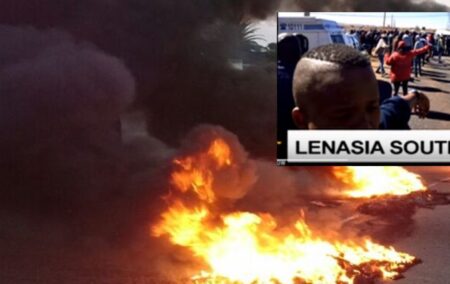This is a high-stakes game, with violent confrontation an ever-present danger.
Land grabs will not be tolerated. At least, this is the message that has come repeatedly from government in outlining its plans. Land reform and the radical redistribution of property will be undertaken under the aegis of a mighty and benevolent state. Do-it-yourselfers and opportunists have no place in this scheme.
Yet as events unfolding to the south of Johannesburg have shown, land invasions are a feature of our society. Much in the news lately has been the erection of a shack settlement near Lenasia South – and the response from established residents.
Replicating images that are only too common in the country – roads blocked by makeshift barriers of rocks, and burning tyres belching acrid smoke – residents took to the streets in protest.
Their concerns were varied. There were allegations that the settlement was bringing crime. Illegal electricity connections and the use of water were said to be disrupting services. Perhaps most important were the implications for the value of the community’s homes. This is unsurprising, since a home typically represents the largest investment that any individual will make in his or her life, and a threat to it is often a threat to the accumulated fruits of a lifetime’s labour.
This is especially the case for the less affluent. Ordinary people, in other words. Their net worth will be heavily bound up with their homes, and they lack the resources and diversity of assets that would allow their wealthier peers to grumble and walk away when one property is rendered worthless.
Hence the protest. This was directed not at the residents of the shack settlement, but at the government. As in innumerable ‘service delivery’ protests, the aim is to attract enough attention to force a government response. In this case, the demand is to remove the settlement. Given the notional commitment of the government to preventing land invasions – expressed by no less a figure than President Ramaphosa – this should be uncontroversial.
The reality is different, and such action is often delayed. This may arise from a genuine concern about what Johannesburg mayor Herman Mashaba called ‘two competing and highly complex challenges which face government at all levels’ – these being the need for housing on the one hand and law enforcement on the other. Or it may be that political leaders, having denigrated property rights as so much ‘privilege’ – an implication of the drive towards Expropriation without Compensation – are reluctant to spend political capital protecting them.
Or it may be simply that too much of the state is compromised and ineffective, unable and unwilling to take decisive action, and by default allows things to take their own course.
This is a high-stakes game. In the Lenasia South affair, there have been reports of violent confrontation between the two groups. These are disputed, but are an ever-present danger under such circumstances.
One resident was quoted in a report as summing up the mix of sentiments: ‘We are done talking. How do you talk to a government that doesn’t listen? It’s time we fought to defend our houses. It’s time we fought to protect our electricity infrastructure which is also under threat from these illegal land invaders. Even if I die, I’ll die peacefully knowing that it was within my rights to fight to protect what is mine.’
Gauteng Human Settlements MEC Lebogang Maile, meanwhile, expressed concern that ‘this situation has the potential of getting out of hand and degenerating to racial war’.
He’s correct to fear that the situation might ‘get out of hand’, if what has been going on doesn’t justify that description already. But it’s simplistic to draw racial lines. Certainly, there is plenty of evidence that African homeowners feel under pressure.
In any event, Lenasia South is far from unique. Last year, a confrontation arose in Protea Glen in Soweto. The concerns – property values, crime, utilities – were in all material respects identical. That is hardly surprising, since their interests were identical. Challenges to one’s assets are likely to provoke remarkably similar responses across communal boundaries, and irrespective of the nature of that challenge.
And as long as government is willing in effect to tolerate land grabs – its rhetoric aside – the danger of things getting ‘out of hand’ is real.
Equally, as long as government is willing to tolerate land grabs, the dangers to people’s property – whatever their colour or background – will be profound.
Terence Corrigan is a project manager at the Institute of Race Relations.
If you like what you have just read, become a Friend of the IRR if you aren’t already one by SMSing your name to 32823 or clicking here. Each SMS costs R1.’ Terms & Conditions Apply.

